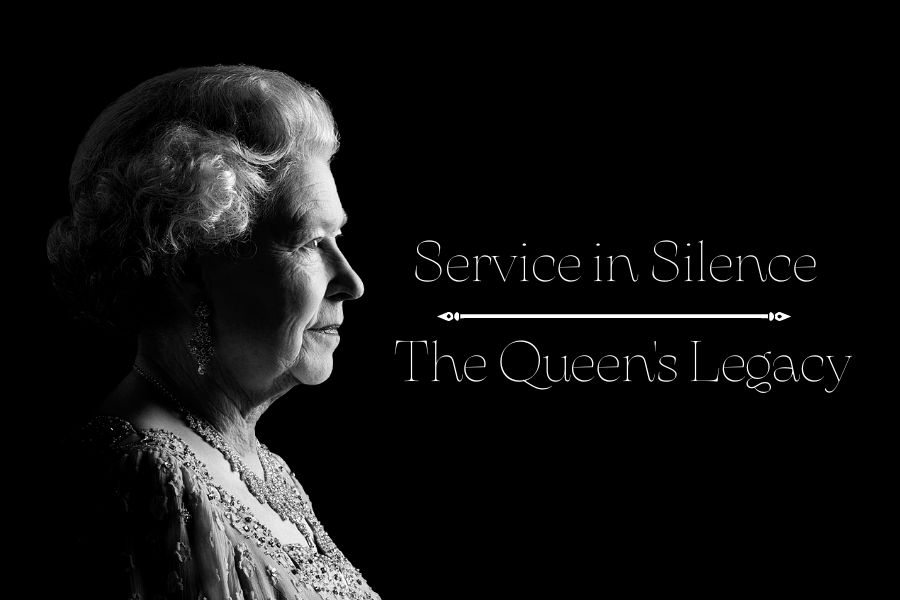Service in silence: the Queen’s legacy
Patrick Lichfield; Canva image created by Daniel Zacher
After the Queen’s death on September 8th, 2022, examining her legacy has become more important than ever.
The rule of Queen Elizabeth II was revered as an example of serving the world with grace and dignity; however, under her leadership, the royal crown was marred by controversy and scandals.
Her unexpected rise to the throne at just 25 years old turned into a seven decade commitment of guiding the British people through prosperity and turbulence. Upon hearing the news of her death, the world seemed to go into mourning, sending their condolences to the United Kingdom. For many people, the Queen has been the most recognizable icon of the United Kingdom for their entire lives.
“I think she is a legacy person in a sense of how long she has held this position,” said Karrie Fredrickson, a social studies and psychology teacher at Sartell High School. “Everyone knows who she is…people still look at that [the monarchy] with an era of mystique, to have kings and queens.”
When the Queen assumed the throne in 1952, post-war Britain was in need of stability – an unchanging face in a changing world. For seventy years, through wars, economic downturns, and crises, the face of the monarchy did not change.
Even when change did come, Queen Elizabeth was not intimidated. To a great extent, she was responsible for modernizing the monarchy and its image. In 1957, the Queen began to televise her annual Christmas broadcast, and nearly 60 years later, in 2014, she sent the first Tweet from her official Twitter account. Generally, the Queen allowed the media to play a larger role in the monarchy’s affairs.
Surprisingly, just a week after her death, many articles from news outlets have started to shift away from mourning her passing to a more retrospective approach, dredging up some of the Queen’s most criticized moments. Much of the criticism directed towards the Queen is fueled by her aggravating political neutrality and reluctance to comment on matters. She virtually stayed silent on many issues that arose during her reign. An article from Vox referred to her as “history’s greatest spectator.”
I can’t imagine how hard that would be to not give your opinion and still try to guide.
— Mrs. Fredrickson
Largely, the revisiting of the Queen’s not-so-finest hours is justified. Queen Elizabeth did have her share of mishaps. One of the most memorable misfortunes of her reign was the year 1992 – dubbed “annus horribilis” (or horrible year) by the Queen herself. In this horrible year, according to Brittanica, an economic recession, a devastating fire at the royal family’s Windsor Castle, and a series of divorces plagued the British Crown. Most notably, Princess Diana and Prince Charles (now King Charles III) announced their separation, and Charles’s admittance of his extramarital affairs only further crumbled support for the royal crown. In more recent times, Prince Harry’s exit from the royal family has further shaken up circumstances.
However, it is easy to remember political blunders from inside the royal family because of how much time they spend in British limelight. Relationships and family drama are heavily covered by the media, and the rest of the world practically watches from the outside as the events unfold.
On the other hand, the British Empire’s controversial overseas endeavors, under the helm of Queen Elizabeth, seemed to go largely unaddressed by the royal family. For example, in 1952, an anticolonial movement, known as Mau Mau, in the then Britain-controlled Kenya led to four years of fighting between the Kikuyu rebels and Kenyan loyalists. 11,000 rebels were killed, and tens of thousands were put in detention camps by British forces, where they were subjected to torture and intensive efforts to alter their nationalist viewpoints, as stated by The New York Times. Other anticolonial efforts arose in other British colonies, including in Cyprus in 1955 and in Yemen in 1963, which led to civilians being subjected to torture. Many records of British imperialist affairs have been destroyed in attempts to protect the monarchy’s image, but the horrors of slavery, exploitation, and genocide still loom over the British colonial legacy.
Regardless, the Queen’s silence persisted.
“We do not mourn the death of Elizabeth, because to us her death is a reminder of a very tragic period in this country and Africa’s history,” said the Economic Freedom Fighters, a South African political party, in a released statement about Queen Elizabeth’s death.
As more colonial countries gained independence, the Queen’s presence in them did not fade. During her reign, she visited over 115 countries and traveled a staggering one million miles, according to the Telegraph. Her global influence grew as her colonial legacy was swept under the rug.
Although Queen Elizabeth’s faults should not be overlooked, her accomplishments can not be undermined as well; from modernizing the monarchy to remaining a beacon of light in the face of change, the United Kingdom would not be what it is today without the presence of Queen Elizabeth II.
The newly crowned King Charles III has already started to speak about scaling back the monarchy, but only time will tell what lies ahead for the 1,000 year-old throne.

Grade: Senior
Hobbies: Playing tennis, spending time with friends, listening to music
Best Restaurant: Papa John's Pizza
Marvel or DC: Marvel
Favorite...














